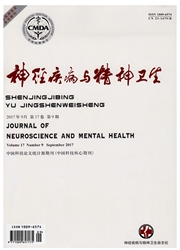

 中文摘要:
中文摘要:
目的 观察高频重复经颅磁刺激(rTMS)对创伤后应激障碍(PTSD)的辅助疗效.方法 将60例创伤后应激障碍患者随机分为联合组及对照组,联合组采用帕罗西汀治疗,配合右侧前额叶背外侧部、10Hz高频rTMS.对照组采用帕罗西汀治疗及假性重复经颅磁刺激治疗.两组患者均治疗4周,并进行基线、治疗后创伤后应激障碍检查表(PCL)及汉密尔顿抑郁测评量表(HAMD)、汉密尔顿焦虑测评量表(HAMA)评定.结果 57例患者完成研究,两组患者治疗后PCL总分及重现、回避、警觉性增高因子分、HAMD、HAMA评分均较治疗前降低,差异有统计学意义(P<0.05);联合组治疗4周末PCL测评总分、重现、警觉性增高因子、HAMA治疗前后评分差均较对照组高,差异有统计学意义(P<0.05).结论 帕罗西汀能够改善PTSD的核心症状及抑郁、焦虑症状;在帕罗西汀治疗基础上,10 Hz重复经颅磁刺激能够增加对PTSD的重现、警觉性增高等核心症状及焦虑症状的疗效.
 英文摘要:
英文摘要:
Objective To observe the effects of high frequency repetitive transcranial magnetic stimulation combined with paroxetine in the treatment of post-traumatic stress disorder. Methods Totals of 60 patients of post-traumatic stress disorder were randomly divided into the combined group and the control group. Patients in combined group were treated with paroxetine hydrochloride and 10Hz high -frequency repetitive transcranial magnetic stimulation on the right side dorsolateral prefrontal place. Patients in control group were treated with paroxetine hydrochloride and pseudo--therapy of repetitive transcranial magnetic stimulation. All the patients were treated for 4 weeks. Before and after the treatment, the patients were tested by the PTSD Checklist (PCL), Hamilton Depression Rating Scale (HAMD) and Hamilton Anxiety Rating Scale (HAMA). Results There were 57 patients received and completed the treatment, the PCL scores, reproduce scores, avoidance scores, hyperarousal scores, HAMD scores and HAMA scores were all lower than before treatment in both two groups, and the difference were statistically significant (P 〈 0.05) ; After 4 weeks' treatment, PCL scores of the combined group decreased more obviously than that of control group, especially the scores of re--experien- cing and hyperarousal, so as the HAMA scores, and the difference were statistically significant (P 〈0.05). Conclusions Paroxetine can improve the core symptoms, depression and anxiety in patients of PTSD, and based on the paroxetine treatment, this benefit effect could be elevated when combined with 10 Hz repetitive transcranial magnetic stimulation.
 同期刊论文项目
同期刊论文项目
 同项目期刊论文
同项目期刊论文
 The effect of citalopram on chronic stress-induced depressive-like behavior in rats through GSK3 bet
The effect of citalopram on chronic stress-induced depressive-like behavior in rats through GSK3 bet Quetiapine add-on therapy improves the depressive behaviors and hippocampal neurogenesis in fluoxeti
Quetiapine add-on therapy improves the depressive behaviors and hippocampal neurogenesis in fluoxeti Gastrodin Ameliorates Anxiety-Like Behaviors and Inhibits IL-1β Level and p38 MAPK Phosphorylation o
Gastrodin Ameliorates Anxiety-Like Behaviors and Inhibits IL-1β Level and p38 MAPK Phosphorylation o Antipsychotics promote the differentiation of oligodendrocyte progenitor cells by regulating oligode
Antipsychotics promote the differentiation of oligodendrocyte progenitor cells by regulating oligode Citalopram alleviates chronic stress induced depression-like behaviors in rats by activating GSK3 be
Citalopram alleviates chronic stress induced depression-like behaviors in rats by activating GSK3 be Electroconvulsive therapy improves antipsychotic and somnographic responses in adolescents with firs
Electroconvulsive therapy improves antipsychotic and somnographic responses in adolescents with firs Sensorimotor gating and memory deficits in an APP/PS1 double transgenic mouse model of Alzheimer&apo
Sensorimotor gating and memory deficits in an APP/PS1 double transgenic mouse model of Alzheimer&apo Anti-depressive mechanism of repetitive transcranial magnetic stimulation in rat: The role of the en
Anti-depressive mechanism of repetitive transcranial magnetic stimulation in rat: The role of the en Quetiapine and repetitive transcranial magnetic stimulation ameliorate depression-like behaviors and
Quetiapine and repetitive transcranial magnetic stimulation ameliorate depression-like behaviors and Gastrodin Alleviates Cerebral Ischemic Damage in Mice by Improving Anti-oxidant and Anti-inflammatio
Gastrodin Alleviates Cerebral Ischemic Damage in Mice by Improving Anti-oxidant and Anti-inflammatio Rosmarinic acid ameliorates PTSD-like symptoms in a rat model and promotes cell proliferation in the
Rosmarinic acid ameliorates PTSD-like symptoms in a rat model and promotes cell proliferation in the Atypical Antipsychotics Do Not Reverse Prepulse Inhibition Deficits in Acutely Psychotic Schizophren
Atypical Antipsychotics Do Not Reverse Prepulse Inhibition Deficits in Acutely Psychotic Schizophren Gastrodin ameliorates anxiety-like behaviors and inhibits IL-1beta level and p38 MAPK phosphorylatio
Gastrodin ameliorates anxiety-like behaviors and inhibits IL-1beta level and p38 MAPK phosphorylatio 期刊信息
期刊信息
